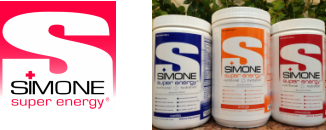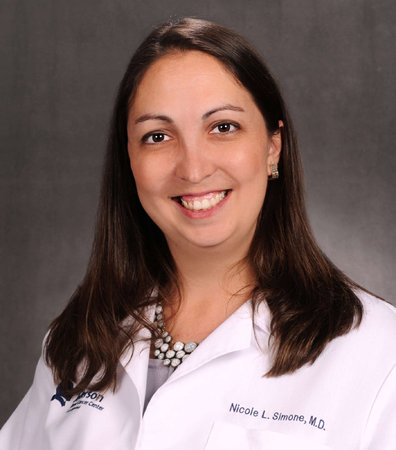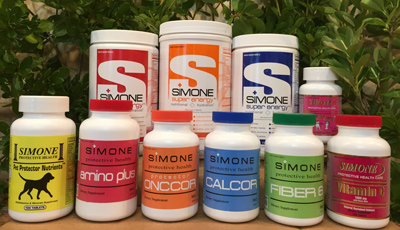8/10/16
We do not diagnose disease or recommend a dietary supplement for the treatment of disease. You should share this information with your physician who can determine what nutrition, disease and injury treatment regimen is best for you. You can search this site or the web for topics of interest that I may have written (use Dr Simone and topic).
“We provide truthful information without emotion or influence from the medical establishment, pharmaceutical industry, national organizations, special interest groups or government agencies.” Charles B Simone, M.MS., M.D.
ADDING A HEALTHY DIET TO THE FIGHT AGAINST CANCER
AUGUST 7, 2016 The INQUIRER
by Sandy Bauers, For The Inquirer
It’s always important to eat wisely, even more so when you’re sick. When it comes to cancer, however, researchers are discovering tantalizing new evidence that a patient’s diet can actually help shrink tumors.
Nicole Simone, MD, a radiation oncologist at Thomas Jefferson University’s Sidney Kimmel Cancer Center, has been studying the effect of diet on standard therapies such as radiation and chemotherapy to see whether what you eat can make a difference. So far, it appears that it does. She spoke to us recently about her research.
An optimum diet is good for everyone. Is it even more important for a person who is battling cancer?
Absolutely. We know that some foods in our diet have been shown to actually promote cancer growth, such as processed sugars and fats. There’s something about the inflammation that diet can cause that can actually promote cancer.
Here’s one way we know that tumors love sugar: In order to see where cancer might have metastasized, we often use a PET scan. That gives us an indication of whether the cancer is in its original site, or if it has spread to the liver or bones or another site. To get those images, the radiologist injects a dye so we can see what lights up, indicating where the tumor is and where it may have gone. That dye is actually just sugar. The cancer likes to eat sugar because it’s very active and it needs food. So if we’re using sugar to see where cancer has gone, you can imagine that a diet high in sugar might be bad.
Overall, battling disease is a matter of getting the right calories. Protein is very good for healing. Fruits and vegetables are good for the immune system. And it’s good to keep your immune system in optimum working order so it can help you in the fight against cancer.
What led you to this line of research?
When I was at the National Cancer Institute, my lab was trying to see if decreasing calories could cause the right amount of good stress in the body to help fight the cancer. If your body is in a stressed state, will it help a little more to fight the cancer? The answer was yes. Decreasing calories can decrease the size of a cancer. It can also decrease the spread of disease and can actually increase survival.
When I came to Jefferson, we wanted to see if decreasing calories could actually make cancer therapies, such as radiation and chemotherapy, work better. The answer was yes again. We saw that diet helps cancer therapies hit the tumor harder, while protecting the normal tissue. We then decided to take this information directly to patients by opening a clinical trial. Our first clinical trial uses radiation with decreased calories for early stage breast cancer. We’re now finished with the first part of the study in 25 patients. We’ve had a great success. All of our patients have lost some weight during radiation, when typically there is actually weight gain. The patients have had fewer side effects and toxicity that is usually associated with radiation, and they feel better. Their quality of life has improved. We also found that decreasing calories, no matter if the patient was overweight or a normal weight, makes cancer therapy work better.
Eating fewer calories often is very difficult for people. What do you think made the difference with these patients?
We explained how important weight control is for cancer outcomes. Based on prior studies, we know that maintaining your weight or decreasing your weight are crucial to preventing cancer recurrences. This is very difficult during the stressful time of cancer treatment, when patients are known to gain weight. Also, we added several components to the trial to try to motivate our patients.
We also review some behavior tips with our patients so that they can learn a little bit better how to read labels in the grocery stores, or what to look for when going out to eat at a restaurant. We meet with them weekly – there was always someone watching over them and cheering them on to be successful. It was as if they had their own personal weight watcher.
What’s next?
We believe that marrying the worlds of precision medicine with precision nutrition can improve cancer care. And we now have a clinical trial to address this. We have directed our attention to a more novel approach of personalizing diets both for the patient and for the tumor. It amounts to taking personalized information from a tumor and developing a diet just for you. We’ll send the initial biopsy for genetic sequencing to see what genes are driving that cancer and making it grow, and then we will determine what diet a patient should be on with chemotherapy.
We hope to have 45 breast cancer patients who will be having chemotherapy before surgery. We’ll be looking at the breast tumor that is removed at the end of chemotherapy to see if the diet worked and if we were able to decrease that molecular driver.
One gene, for example, is called c-MYC. If that gene is driving your cancer, there is a lot of evidence that some foods may be more beneficial to decrease that gene and help regular cancer therapies work better. For patients whose tumor’s genetic testing shows a c-MYC abnormality, we’re telling them to enrich their diets with pectin, which is in apples and oranges. Also, choline, which is in almonds, yogurt, and egg yolks.
What about all this fascinates you?
Using food and calories to treat cancer. Before the first study I did, people hadn’t used diet to try to treat cancer. It had been used as an additive – people making recommendations for eating healthy, especially for cancer survivors. But it’s not been used specifically to enhance the therapy and make it work better. If we can actually use diet to make cancer treatment work better, instead of adding new drugs that have side effects, we can be cost-effective, we can decrease toxicity, and we may get improved survival, just by changing the foods that we eat.
Women with breast cancer who are interested in enrolling in the clinical trial at Jefferson should call 215-955-9626.
(c) 2017 Charles B. Simone, M.MS., M.D.



